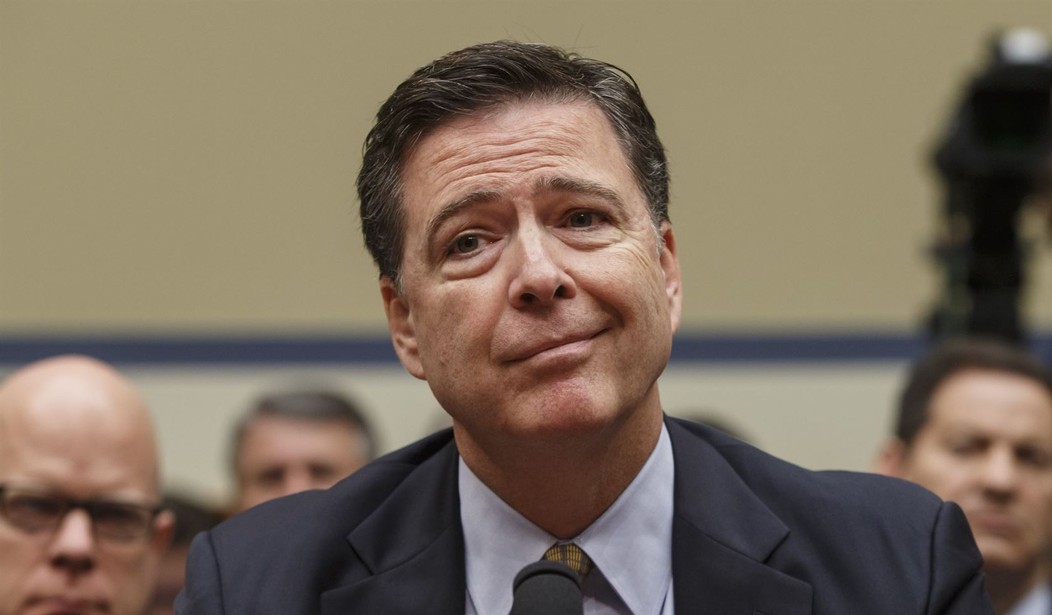One of the most tiresome elements of the endless Trump/Mueller/Russia drama is partisans angrily fighting over words that are synonyms. The most obvious example is "collusion." The president and his supporters have quite rightly cheered Robert Mueller's conclusion that Trump's campaign did not collude with the Russians -- but this simple assertion of fact is met with furious pushback from many on the Left who insist that Mueller technically didn't render any judgment on collusion. But Mueller did lay out his preferred lexicon in his office's report: "Conspiracy" as a legal term, and "coordination" as a broader term that involves two or more entities knowingly working together toward a common end, having tacitly or expressly agreed to do so:
Mueller addresses the use of the terms 'conspiracy' and 'coordination' vs. 'collusion.' The first is a legal term, the latter two are terms of art. Mueller found no conspiracy or coordination between Russia and the Trump campaign. pic.twitter.com/fDBjW4bBkp
— Guy Benson (@guypbenson) April 18, 2019
The Special Counsel's investigation found neither a conspiracy nor any coordination. Coordination, as explicitly defined by Mueller, is synonymous with collusion. And because so many politicians and media figures have repeatedly used the latter term as a shorthand for witting cooperation, it is absolutely fair and reasonable to summarize Mueller's Volume I findings as "no collusion." As Mitch McConnell correctly stated yesterday, "case closed." So-called "fact checks" to the contrary are tediously pedantic, and look like little more than partisan venting. Then there's the obnoxious furor over Attorney General William Barr using the word "spying" to describe the Obama-era Justice Department's actions against certain figures attached to the Trump campaign. Critics immediately objected, arguing that 'spying' has negative and insidious connotations, whereas 'surveillance' connotes properly-predicated or legal spying. That's fine, but the media has frequently used those words interchangeably, as synonyms, in the past. What's changed? Democratic talking points:
And what’s with journalists suddenly becoming squeamish about the word “spy,” which they’ve long used to describe intelligence activity? The answer is that Democrats now don’t like the word and too many journalists take their cues from the Democrats. https://t.co/1BfKSSrwaz
— Brit Hume (@brithume) May 8, 2019
Recommended
The core question is whether the spying/surveillance was legitimate or abusive. It's an open question with some evidence on both sides. We've gotten indications that the Inspector General's report may be pretty tough on the FBI's decision to treat Christopher Steele as a credible source of information (some of which may actually have been peddled to Steele by the Russians). We also know that the DOJ obscured the partisan funding of Steele's dossier in its FISA warrant applications. Barr says he has a team looking into this broader issue, which may help explain the ferocity with which Democrats have sought to discredit him, deploying all sorts of deranged and disproportionate attacks. It's almost as if they manufactured a reason to hold him in contempt. Here's Wall Street Journal columnist Kimberly Strassel:
Fear is what’s driving this week’s blitzkrieg of Attorney General William Barr...The attorney general said he’d already assigned people at the Justice Department to assist his investigation of the origins of the Trump-Russia probe. He said his review would be far-reaching—that he was obtaining details from congressional investigations, from the ongoing probe by the department’s inspector general, Michael Horowitz, and even from Mr. Mueller’s work. Mr. Barr said the investigation wouldn’t focus only on the fall 2016 justifications for secret surveillance warrants against Trump team members but would go back months earlier...Do not underestimate how many powerful people in Washington have something to lose from Mr. Barr’s probe.
Among them: Former and current leaders of the law-enforcement and intelligence communities. The Democratic Party pooh-bahs who paid a foreign national (Mr. Steele) to collect information from Russians and deliver it to the FBI. The government officials who misused their positions to target a presidential campaign. The leakers. The media. More than reputations are at risk. Revelations could lead to lawsuits, formal disciplinary actions, lost jobs, even criminal prosecution. The attacks on Mr. Barr are first and foremost an effort to force him out, to prevent this information from coming to light until Democrats can retake the White House in 2020. As a fallback, the coordinated campaign works as a pre-emptive smear, diminishing the credibility of his ultimate findings by priming the public to view him as a partisan.
I'll leave you with contradictory-seeming statements from the increasingly insufferable James Comey and known perjurer James Clapper on the exhausting semantic battle over how we're allowed to talk about "spying:"
Comey unleashes on AG Barr: "The FBI doesn't spy" https://t.co/9q2txRRWqQ pic.twitter.com/o9MhQSaXre
— The Hill (@thehill) May 8, 2019
JAMES CLAPPER admits that what the Obama Administration did to the Trump campaign "meets the dictionary definition of SPYING" pic.twitter.com/0T0nQJrK26
— Official Trump War Room (@TrumpWarRoom) May 8, 2019
These two men could certainly reconcile their respective statements, but it would involve an awful lot of parsing about dictionary definitions versus the true spirit of different words that have very similar meanings.

























Join the conversation as a VIP Member